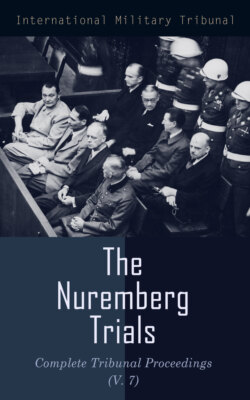Читать книгу The Nuremberg Trials: Complete Tribunal Proceedings (V. 7) - International Military Tribunal - Страница 22
На сайте Литреса книга снята с продажи.
[The Tribunal recessed until 1400 hours.] Afternoon Session
ОглавлениеTable of Contents
M. CONSTANT QUATRE (Assistant Prosecutor for the French Republic): Mr. President, Your Honors, I have the honor today to bring to a close the presentation of the French Prosecution by recapitulating the charges against the Defendants Wilhelm Keitel and Alfred Jodl. Before going into my statement, I shall ask the Tribunal for permission to present a few observations. First of all, to spare the time of the Tribunal, we have joined the two defendants in the same brief. Their activities were carried on so much in common that in separating them we would run the risk of tedious repetitions and for this reason, I am condensing as far as possible what I have to say.
This presentation consists of three parts. In an introduction, I have endeavored to show the position of the two defendants in the general design of their activities. The first part following this deals with the preparation of plans of aggression, and will only be mentioned. It has already been sufficiently expounded so that it need not be brought up again.
The second part will claim my special attention. It concerns the responsibility incurred by the defendants for the crimes committed in the course of the war. In this connection, I shall not mention all the documents, testimonies, and interrogatories concerning these two defendants. If their guilt is a function of the repetition of their crimes, its main characteristic is the criminal intent which caused these crimes to be carried out. This criminal intent is made particularly clear by the few documents to which I have limited myself. I shall ask the Tribunal’s permission to make a few intentionally brief quotations from these.
The documents quoted will be first quoted under the session number, which you will find written in red in the margin of the copy before you. I shall thereupon indicate the original number. If the document has already been submitted, I shall furnish the date at which it was submitted and the number under which it was submitted.
As Chief of the National Socialist Party and subsequently as Chancellor of the Reich, Hitler endeavored to gain sole control of the German Army. He wanted the unity which he had established between Party and State to prevail throughout the Army, the State, and the Party. Only under these conditions would the war machine be capable of fulfilling its function. The initial impulse would come from the Party, the State would translate it into action, and the Army would impose it, if necessary, both at home and abroad.
To achieve this aim it was necessary first of all to impose legislation which would in fact bring the whole military organization under the Führer’s orders. It was also necessary to take steps to eliminate personalities too unyielding to submit to these measures. The execution of Von Schleicher in 1934 and the disgrace of Blomberg in 1938 are two examples. All that remained was to provide for their replacement by military chiefs whose conscience was sufficiently elastic to allow them to play the part of faithful executives. Keitel and Jodl were among these.
Their personal convictions and their rapid rise to eminence prove this. Questioned on 3 August 1945 by Colonel Ecer of the Czechoslovakian Military Judiciary, the Defendant Keitel spoke thus of his relations with Hitler and the National Socialist Party, (Exhibit Number RF-1430, formerly Document Number RF-710):
